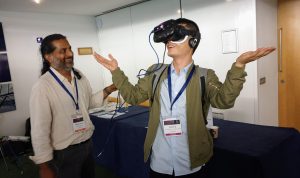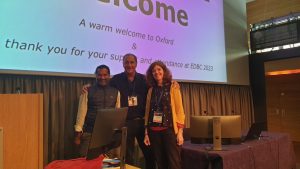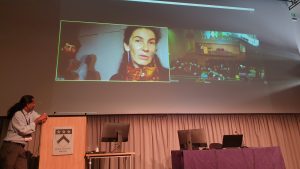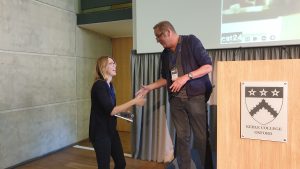7 March 2024
 We are delighted to see that the biology community has been showing their natural creativity by experimenting with different conference models (Lowell et al. 2022) and we have been very pleased to support some of these experiments with funding through our Sustainable Conferencing Grants.
We are delighted to see that the biology community has been showing their natural creativity by experimenting with different conference models (Lowell et al. 2022) and we have been very pleased to support some of these experiments with funding through our Sustainable Conferencing Grants.
To signal our enthusiasm for supporting innovation The Company of Biologists have changed the name of our funding scheme to the Fund for Innovations in Sustainable Conferencing. Our funding criteria have not changed, so not all funding requests need to be highly innovative, but we especially encourage requests for funding to test new and innovative ways of delivering events, whether these are small changes or big ones.
One recent example of a conference that we supported was the European Society for Developmental Biology meeting in September 2023, which took place across three different regional venues.This hybrid meeting was distributed across three in-person hubs in different European cities: Oxford, Paris and Barcelona. These three locations had been strategically chosen to minimise the distance needed to travel by plane and to maximise the opportunities and availability to use public transport, such as buses and trains. You can read more about the meeting report for this meeting on the Node. We spoke to one of the organisers, Sally Lowell, to learn about how the conference went.
Sally Lowell is a member of The Company of Biologists’ Board of Directors. She is also one of the driving forces behind The Company of Biologists’ Sustainability Initiative.
Q: What was your motivation for running a multi-hub conference?

SL: The main hub of our conference was in Oxford, but we knew that many in our community are cutting down on conference travel for a range of reasons including concern for the environment, financial limitations, or caring duties, so we wanted to offer online access for those who could not travel to the UK. But we also knew that watching a conference on your own on a screen doesn’t offer the same benefits as an in-person meeting. This is why we decided to try to bring some of our remote participants together in local hubs, which would include live talks streamed into the Oxford site as well as poster sessions and social events at each site. We didn’t know how this would compare to the experience of having everyone together at one large in-person conference, but we were confident it would be a much better experience than sitting alone watching the conference on a laptop.
Q: How did it go?
SL: We think it was a great success! We are delighted with the meeting reports recently published on the Node from attendees at the main Oxford hub and the smaller Paris hub.
Q: What tips could you give to others who want to design a conference of this type?
SL: First and foremost, find co-organisers who are enthusiastic, creative, energetic and cheerful! I had fantastic co-organisers from the British Society for Developmental Biology, Paul Martin and Shankar Srinivas, who were brave enough to take on what felt like quite a risky proposition and did a brilliant job. We were extraordinarily fortunate to find wonderful hub-organisers: Sigolène Meilhac, Nicola Festuccia, Tanya Foley, Tom Cumming and Guillaume Frasca in Paris, and Alejo Fraticelli, Alfonso Martinez Arias, and Marta Morey Ramonell in Barcelona. Enormous thanks to them all.

Good communication between hubs is critical to coordinate shared talks and Q&As. This doesn’t need to be complicated. For instance, we used WhatsApp. It helped to have two Chairs at each site: one to perform the usual duties of Chair, and the other to field WhatsApp messages and troubleshoot any technical problems behind the scenes.
It is essential to have access to good technical expertise. You don’t necessarily need fancy software. In our case, we just used Zoom. However, you do need some tech know-how and planning to work out how to switch seamlessly between sites. Although things went quite well for us, I think there is still a lot to learn about the technical side of running multihub conferences.
Finally, conferences should be fun! We didn’t want our delegates to feel that they were missing out on the social side of conferences just because some of the other attendees were on the other side of a screen, so we put even more effort than usual into providing a range of social activities.
Q: What would you do differently next time?
SL: We would have loved to have a broader geographical spread of hubs across Europe. This broad spread had been part of our original vision, but we ended up limiting ourselves to Oxford, Paris and Barcelona just for practical reasons. This brings up another top tip for people considering alternative conference models: do what works for you! Your conference design may not be the perfect solution for solving problems of sustainability and accessibility, but any small experiment is a step in the right direction.
It would also be interesting to try having three equally sized hubs. I’m not sure if this would be better or worse than having one large hub and two smaller ones as we did, but it could perhaps work very well if, for example, national societies work together to create hubs within their own countries.
We’d also liked to have experimented more with shared social events across the three hubs, for example a hybrid pub quiz or panel discussions.
Q: What about the other idea that you have trialled during the EDBC? Can you tell us more about the other ’Watch Parties‘ organised by the participants?
SL: For people who could not travel to any of the three hubs in person, we suggested that they get together locally to organise Watch Parties.
We were really pleased to see a good take up of this idea. We have the impression that attempts to organise relatively large watch parties were not always so successful, but the smaller groupings were great, bringing together people from perhaps just one or two labs. I also enjoyed seeing pictures of mini-watch parties that included people’s families (shout out to Kyra Campbell and her kids) or their pets (kudos to Tamina Lebek and her beautiful cat Kiki).
A particular highlight for me was hearing about the small watch party organised by Nick Monk with some of his Mathematical Modelling students in Ghana. Nick has given me permission to quote from the email he sent me afterwards. This really brought home to me the way that relatively simple initiatives, such as watch parties, can make a real difference:
“Thank you for coming up with the idea of the watch parties … I hosted four local research students [for an EDBC watch party] …. it was an invaluable opportunity for them all to participate in an excellent international conference and see how exciting developmental biology is for modellers. There is little if any developmental biology going on in West Africa, so they’re not going to get this kind of exposure locally. They all loved it, and two have already sent me their CVs for PhD positions!
… this kind of initiative could be transformative for our students. It was a really positive experience: the students had lots of questions and thoughts, and the opportunity to discuss them in a non-challenging environment was probably more helpful for them at this stage than being physically present.“
Prof. Nick Monk, African Institute for Mathematical Sciences, Ghana and The University of Sheffield, UK
Q: Finally, would you organise another multi-hub meeting, and would you recommend this model to other conference organisers?
SL: A big YES on both counts!
 Contact us
Contact us
Do you know any innovative technology that you would like to use for making your next event sustainable? Or do you just have a more sustainable idea that you would like to try at your next event, but cannot afford to? We would love to hear from you! Creativity is the key to progress, and we are here to support you with the Fund for Innovations in Sustainable Conferencing. We want to spread awareness of new technologies and fresh ideas, and will share stories of successful projects through our blogs.
As Sally Lowell said, “I have become increasingly worried about the impact of conferences on the environment. We are all aware of how important conferences are to bring people together, so we have a problem.” Let’s solve this dilemma together!
Reference
Lowell, Sally, Alistair Downie, Holly Shiels, and Kate Storey. 2022. “The Future of Conferences.” Development (Cambridge, England) 149 (1). https://doi.org/10.1242/dev.200438.








You must be logged in to post a comment.